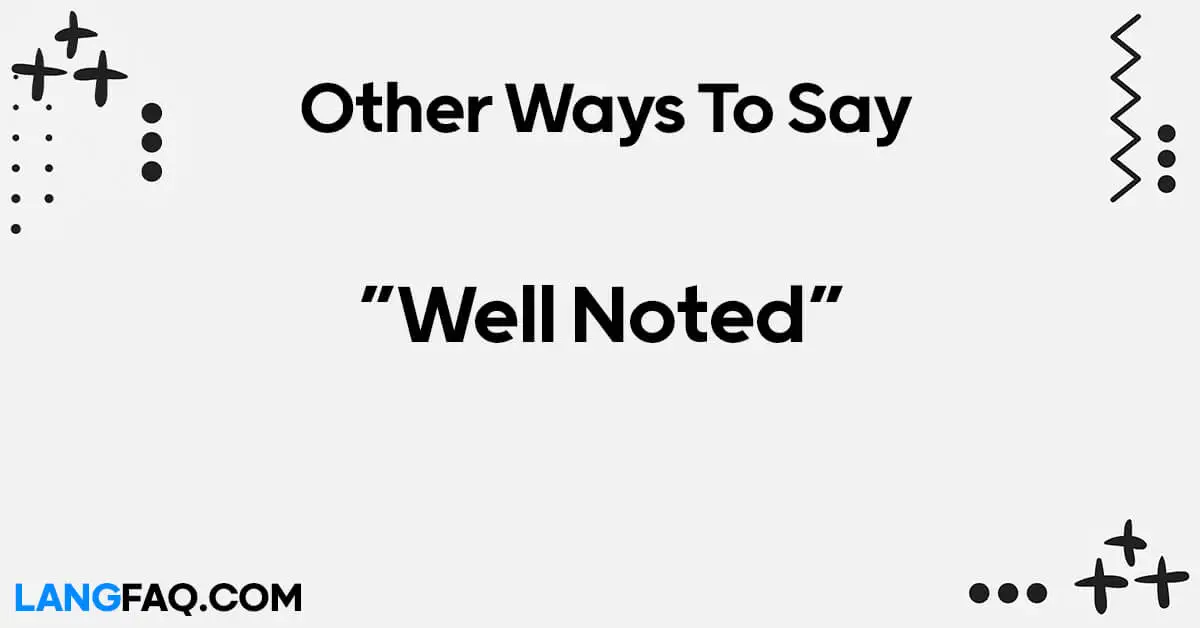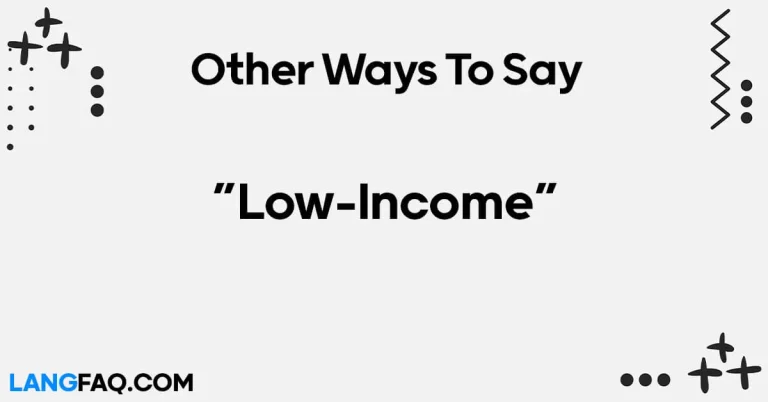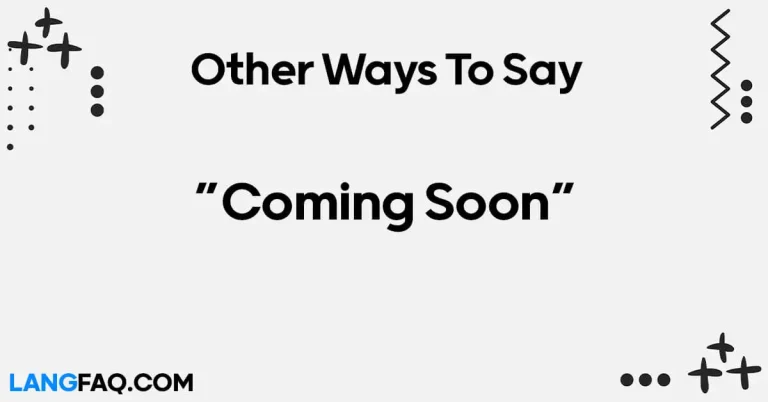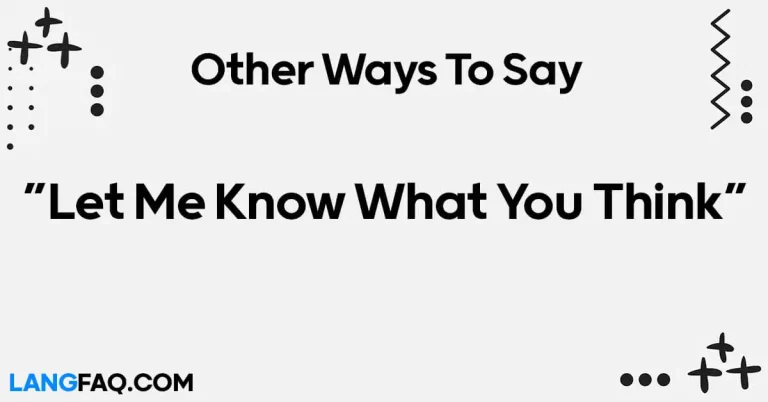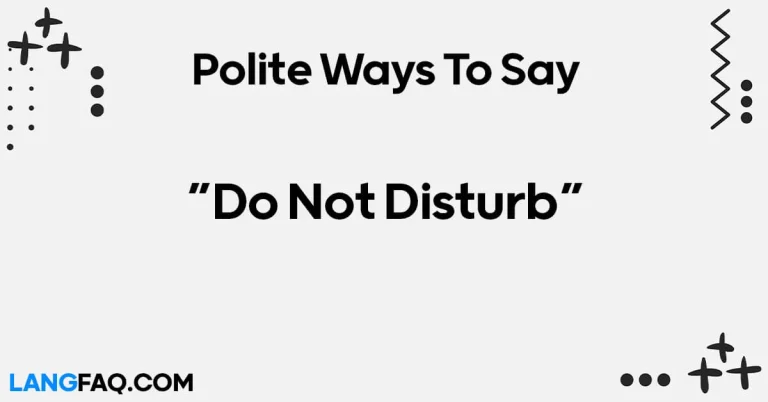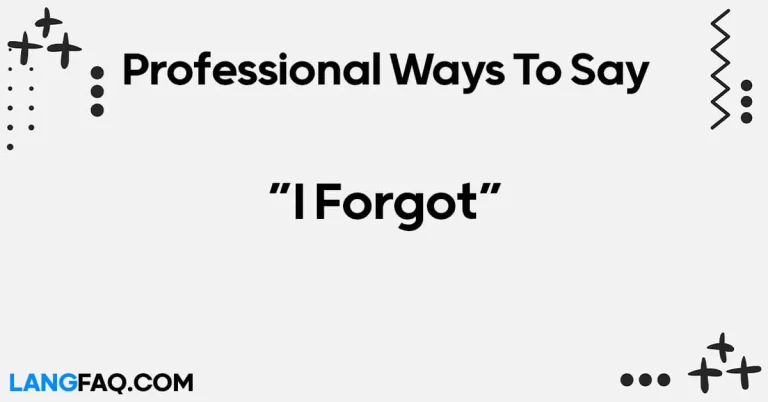In the vast landscape of language, finding diverse ways to convey a simple acknowledgment like “Well Noted” can enhance your communication skills. This guide unfolds 12 unique expressions that not only communicate acknowledgment but also add a touch of creativity and flair to your language. Let’s embark on this linguistic journey together.
12 Other Ways to Say “Well Noted”
Here are 12 other ways to say “Well Noted”:
- Acknowledged
- Understood
- Received
- Affirmed
- Confirmed
- Recognized
- Noted and Agreed
- I Hear You
- Roger that
- Copy that
- Message received
- Loud and clear
| Expression | Meaning | Examples |
|---|---|---|
| Acknowledged | Formal acknowledgment | “Your message has been acknowledged.” |
| Understood | Conveys comprehension and acknowledgment | “I understood your instructions.” |
| Received | Indicates the message has been received | “The information has been received.” |
| Affirmed | Confirms and supports the given information | “I affirm your decision.” |
| Confirmed | Provides assurance of accuracy | “I confirm the details you provided.” |
| Recognized | Acknowledges awareness of the information | “I recognized the significance of your words.” |
| Noted and Agreed | Acknowledges and expresses agreement | “Your proposal is noted and agreed upon.” |
| I Hear You | Empathetic acknowledgment | “I hear you and understand your concerns.” |
| Roger that | Military-style acknowledgment | “Roger that, proceeding as instructed.” |
| Copy that | Acknowledges understanding, especially in radio communication | “Copy that, information received.” |
| Message received | Confirms reception of the message | “Message received loud and clear.” |
| Loud and clear | Emphasizes clear understanding and acknowledgment | “Your instructions are loud and clear.” |
Exploring these alternative expressions for “Well Noted” adds richness and versatility to communication. Each phrase carries a unique nuance, allowing individuals to tailor their acknowledgments to different contexts and tones. Whether in formal or informal settings, having a diverse set of expressions enhances effective communication.
Is It Correct to Say “Well Noted”?
Certainly! The phrase “Well Noted” is a correct and widely accepted way of acknowledging information. It is commonly used in both formal and informal settings to convey that you have received and understood the information provided.
Explanation:
- Formal Usage: In professional or formal contexts, “Well Noted” is often employed to acknowledge directives, instructions, or important information. It carries a tone of professionalism and indicates a respectful recognition of the communicated message.
- Informal Usage: In more casual or everyday conversations, “Well Noted” can still be used to acknowledge information, though it may lean towards a more formal tone. In such settings, people might opt for more informal alternatives like “Got it,” “I see,” or “Understood.”
Example Sentence: “Your suggestions for improving the project proposal have been well noted, and we will incorporate them into the final draft.”
Variations:
- Colleague Interaction: “Well noted on the meeting time change. I’ll adjust my schedule accordingly.”
- Informal Setting: “Your message about the dinner plans is well noted. I’ll be there on time.”
Dictionary Insight: According to the Cambridge Dictionary, “Well Noted” means to be officially recognized or recorded because it is important or significant.
Usage Tip: While “Well Noted” is correct and appropriate, it’s essential to consider the formality of the situation. In more casual settings, using alternative phrases like “Got it” or “I understand” might better suit the tone of the conversation. However, in formal or professional contexts, “Well Noted” remains a courteous and proper acknowledgment.
Professional Mail Example With “Well Noted”
Subject: Confirmation of Meeting Schedule Adjustment
Dear [Recipient’s Name],
I trust this email finds you well. I am writing to inform you of a slight adjustment to our upcoming meeting schedule.
After reviewing our calendars, it has been decided to move the meeting forward by 30 minutes to accommodate everyone’s availability. The revised time for our meeting is now set for 2:30 PM on [Date], in the [Meeting Room/Online Platform].
Your active participation and input in this meeting are highly valued, and we believe this adjustment will ensure a more effective and convenient discussion for all team members.
If you have any concerns or conflicts with the new timing, please don’t hesitate to let me know at your earliest convenience. Your flexibility in this matter is greatly appreciated.
Looking forward to your continued contributions to the team’s success.
Best regards,
[Your Full Name] [Your Position] [Your Company] [Contact Information]
Duly Acknowledged: Recognizing Formality and Respect
In professional communication, “Duly Acknowledged” serves as a formal and respectful way to convey acknowledgment. It implies a sense of formality and respect for the information received.
Scenario: In a business context, when acknowledging receipt of an important document or directive, “Duly Acknowledged” adds a layer of formality.
Example Sentence:
“Dear [Sender’s Name],
Your email regarding the policy updates has been duly acknowledged. We appreciate the thorough explanation and will adhere to the new guidelines.
Best regards, [Your Name]”
Variations:
- Colleague Interaction: “Duly acknowledged your input on the project. Let’s discuss further in the meeting.”
- Mentor-Mentee Context: “Your guidance on career development is duly acknowledged. I’ll implement the suggested strategies.”
Dictionary Insight: According to the Cambridge Dictionary, “duly” means in the correct or expected way.
Usage Tip: Use “Duly Acknowledged” in formal communication to convey respect and adherence to protocols.
Received Loud and Clear: Emphasizing Clarity in Communication
The phrase “Received Loud and Clear” is commonly used in radio communication to confirm not only the reception of a message but also its clarity. It can be adapted for various contexts to emphasize a clear understanding.
Scenario: In a project management setting, when confirming instructions for a critical task, “Received Loud and Clear” ensures that the message is not only acknowledged but also well understood.
Example Sentence:
“Team,
The client’s requirements for the upcoming presentation are received loud and clear. We’ll ensure all aspects are covered for a successful delivery.
Best, [Your Name]”
Variations:
- Informal Setting: “Your message about the weekend plans is received loud and clear. Looking forward to it.”
- Colleague Interaction: “Received loud and clear on the updated meeting time. I’ll adjust my schedule accordingly.”
Dictionary Insight: The phrase “Loud and Clear” is commonly used in radio communication to confirm that a message has been heard and understood.
Usage Tip: Use “Received Loud and Clear” when you want to emphasize both acknowledgment and a clear understanding of the conveyed message.
Noted with Thanks: Adding Gratitude to Acknowledgment
“Noted with Thanks” combines acknowledgment with appreciation, adding a polite touch to the recognition of information received. This phrase is suitable for both professional and personal communication.
Scenario: In business correspondence, when acknowledging feedback or suggestions, “Noted with Thanks” expresses acknowledgment while appreciating the input.
Example Sentence:
“Dear [Sender’s Name],
Your feedback on the project proposal is duly noted with thanks. We value your insights and will incorporate the suggested changes.
Best regards, [Your Name]”
Variations:
- Informal Gratitude: “Your advice on the travel itinerary is noted with thanks. It’s incredibly helpful.”
- Professional Appreciation: “The team’s hard work on the latest project is noted with thanks. Great job!”
Dictionary Insight: According to the Cambridge Dictionary, “noted” means officially recognized or recorded because it is important or significant.
Usage Tip: Use “Noted with Thanks” to convey acknowledgment with a polite and appreciative tone, suitable for various communication scenarios.
Understood and Acknowledged: Conveying Comprehensive Recognition
“Understood and Acknowledged” goes beyond a simple acknowledgment, indicating not only that the information has been received but also comprehended. This phrase is versatile, suitable for both formal and informal settings.
Scenario: In project management, when confirming instructions for a complex task, “Understood and Acknowledged” assures the sender that not only has the message been received but also fully comprehended.
Example Sentence:
“Dear [Sender’s Name],
Your directives for the upcoming client presentation are understood and acknowledged. We’ll ensure every detail is executed as per your expectations.
Best, [Your Name]”
Variations:
- Informal Setting: “Your message about the party plans is understood and acknowledged. I’ll be there on time.”
- Colleague Interaction: “Your input on the team’s goals is understood and acknowledged. Let’s collaborate for success.”
Dictionary Insight: According to the Cambridge Dictionary, “understood” means known or realized.
Usage Tip: Use “Understood and Acknowledged” when you want to convey both acknowledgment and a thorough comprehension of the conveyed message.
Message Received and Noted: Comprehensive Communication Confirmation
“Message Received and Noted” combines acknowledgment with a detailed recognition of the information conveyed. It is suitable for various communication channels, emphasizing both reception and understanding.
Scenario: In email communication, when acknowledging feedback or instructions, “Message Received and Noted” ensures that the sender knows the information has been received, understood, and duly recognized.
Example Sentence:
“Dear [Sender’s Name],
Your email outlining the project milestones is received and noted. We appreciate the detailed breakdown and will align our efforts accordingly.
Best regards, [Your Name]”
Variations:
- Informal Setting: “Your text about the weekend plans is received and noted. Looking forward to it.”
- Professional Acknowledgment: “Your memo on the updated company policies is received and noted. We’ll disseminate the information to the team.”
Dictionary Insight: According to the Cambridge Dictionary, “noted” means officially recognized or recorded because it is important or significant.
Usage Tip: Use “Message Received and Noted” when you want to convey a thorough acknowledgment, indicating not only reception but also understanding and recognition of the communicated message.
Grasped and Recognized: Emphasizing Understanding and Acknowledgment
The expression “Grasped and Recognized” goes beyond a simple acknowledgment, emphasizing a profound understanding and recognition of the conveyed information. This phrase adds a layer of assurance, ensuring the sender that the recipient not only received the message but fully comprehends its significance.
Scenario: In a mentoring relationship, when acknowledging advice or guidance, “Grasped and Recognized” communicates not only acknowledgment but also a deep understanding of the mentor’s insights.
Example Sentence:
“Dear [Mentor’s Name],
Your guidance on leadership principles is truly appreciated and has been thoroughly grasped and recognized. I am committed to implementing these principles in my role.
Best regards, [Mentee’s Name]”
Variations:
- Colleague Acknowledgment: “Your insights during the team meeting are grasped and recognized. Let’s collaborate for success.”
- Informal Recognition: “Your advice on the personal project is fully grasped and recognized. Thanks for the support.”
Dictionary Insight: According to the Cambridge Dictionary, to grasp means to understand something clearly.
Usage Tip: Use “Grasped and Recognized” when you want to convey a profound acknowledgment, emphasizing not only that the information has been received but also deeply understood and recognized.
Affirmative: Confirming and Supporting Information
“Affirmative” is a concise way to confirm receipt and express support or agreement with the conveyed information. This term is often used in situations where a clear and positive acknowledgment is needed.
Scenario: In a professional setting, when confirming a decision or course of action, “Affirmative” communicates not only acknowledgment but also explicit agreement.
Example Sentence: “Your proposal for cost-saving measures is acknowledged with an affirmative. We believe this strategy aligns with our goals and will lead to positive outcomes.”
Variations:
- Formal Agreement: “Affirmative on the revised project timeline. We’re aligned with the proposed schedule.”
- Team Support: “Your initiative is acknowledged with an affirmative. We fully support this endeavor.”
Dictionary Insight: According to the Cambridge Dictionary, “affirmative” means expressing agreement or saying ‘yes.’
Usage Tip: Use “Affirmative” when you want to convey a clear and positive acknowledgment with explicit support or agreement, especially in decision-making contexts.
Crystal Clear: Emphasizing Clarity and Understanding
The term “Crystal Clear” is an idiom that signifies not only acknowledgment but also a clear and unambiguous understanding of the conveyed message. This phrase adds a touch of emphasis on clarity.
Scenario: In a project briefing, when confirming instructions or expectations, “Crystal Clear” assures the sender that the message has not only been received but is also well understood.
Example Sentence: “Your guidelines for the upcoming presentation are crystal clear. We’ll ensure every detail aligns with your expectations for a successful delivery.”
Variations:
- Informal Setting: “Your explanation of the game rules is crystal clear. Let’s start playing.”
- Colleague Interaction: “Your instructions for the client meeting are crystal clear. I’ll coordinate with the team for preparation.”
Dictionary Insight: According to the Cambridge Dictionary, “crystal clear” is an idiom used to describe something that is extremely easy to understand.
Usage Tip: Use “Crystal Clear” when you want to emphasize not only acknowledgment but also a clear and unambiguous understanding of the conveyed message.
Got It, Thanks: A Casual and Appreciative Acknowledgment
“Got It, Thanks” combines a casual tone with gratitude, providing a straightforward and friendly acknowledgment. This phrase is versatile and can be used in various contexts, both formal and informal.
Scenario: In everyday communication, when acknowledging information or instructions, “Got It, Thanks” maintains a friendly and approachable tone.
Example Sentence: “Your email with the project updates is received. Got it, thanks! I’ll review the details and follow up if needed.”
Variations:
- Casual Appreciation: “Your message about the team outing is received. Got it, thanks! Looking forward to it.”
- Professional Informality: “Your memo on the meeting agenda is acknowledged. Got it, thanks! I’ll be well-prepared.”
Dictionary Insight: The phrase “Got It” is an informal way of saying that you understand something.
Usage Tip: Use “Got It, Thanks” for a friendly and informal acknowledgment, suitable for a wide range of communication scenarios.
I’ve Taken Note: Formal Acknowledgment with Added Assurance
“I’ve Taken Note” is a formal and detailed acknowledgment that not only signifies reception of information but also assures the sender that the details have been actively recorded or noted. This expression adds a layer of professionalism to the acknowledgment.
Scenario: In a corporate setting, when acknowledging instructions from a superior, “I’ve Taken Note” conveys not just acknowledgment but a commitment to remembering and acting upon the information.
Example Sentence:
“Dear [Supervisor’s Name],
Your guidance on the project milestones has been duly received, and I want to assure you that I’ve taken note. I’ll ensure each milestone is met with precision and timeliness.
Best, [Your Name]”
Variations:
- Colleague Interaction: “Your suggestions in the team meeting are acknowledged, and I’ve taken note. Let’s implement these changes collaboratively.”
- Mentor-Mentee Context: “Your advice on professional development is noted with gratitude, and I’ve taken note of the actionable steps.”
Dictionary Insight: According to the Cambridge Dictionary, to take note means to give attention to something because it is important.
Usage Tip: Use “I’ve Taken Note” when you want to convey a formal acknowledgment with a commitment to actively remember and act upon the conveyed information.
FAQs
What’s the difference between “Acknowledged” and “Understood”? Both convey acknowledgment, but “Acknowledged” is more formal, while “Understood” emphasizes comprehension as well.
Can “Got it” be used in professional settings? While more informal, “Got it” can be used in professional settings with colleagues you have a rapport with.
When is “Noted and Agreed” most suitable? This expression is best used when you want to convey both acknowledgment and agreement in a formal context.
Is “I Hear You” appropriate in business communications? Yes, especially in situations where understanding the emotional context is crucial, “I Hear You” can be effective.
Any creative alternatives for informal settings? Certainly! “Copy that,” “Loud and clear,” and “Gotcha” are informal yet engaging alternatives.
How can I add flair to my acknowledgments? Experiment with phrases like “Roger that,” “Crystal clear,” or “Message received” for a more distinctive touch.
Conclusion
Mastering alternative expressions for “Well Noted” not only adds versatility to your language but also allows you to tailor your acknowledgments to different contexts. From formal settings to casual conversations, the richness of language lies in the variety of expressions we use. Elevate your communication game with these 12 alternatives and make your acknowledgments memorable.

